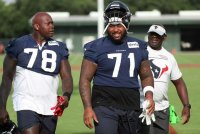Picture this: Obo Okoronkwo wreaking havoc for the Texans
Brooks Kubena, Staff writer
May 27, 2022Updated: May 27, 2022 11:19 a.m.
There is not room enough on the walls for the Okoronkwos and their pictures.
Frames border frames in a hall filled with faces. Frames stand on the tiled living room floor. They lean against the TV stand, the fireplace. There are more frames on the mantle.
There is a palpable warmth from the wedding portraits and family photos, the tangible timeline of the Okoronkwos’ immigration from Nigeria to America. There’s a sense of approval and completion now that the newly signed Texans defensive end nicknamed “Obo” has returned home.
“A picture is history,” Obo’s father, Benson, says. “It reflects. You see how you were, how you used to be. And that brings memories.”
Here’s a picture of a Gainesville, Fla., hospital room. Here’s Benson laying cultural fabric embroidered with the symbolic crest of the Igbo people and the words “Omu Arochukwu” over his son, who at 13 pounds, 3 ounces was the largest baby born in the hospital’s history, the family says.
Here’s Obo as a young boy, shirtless and painted, performing the traditional war dance that males of the Arochukwu kingdom once danced before battling neighbors who sold hundreds of thousands of Igbo people into the slave trade from the 17th to the 19th century.
“Omu” is the leaf of the palm tree, the Igbos’ symbolic life force. They believe they are God’s people, his descendants, and the Okoronkwos’ faith continues through Ogbonnia, whose name means favor from God.
The collective effect of the pictures nearly creates an audience, the kind of crowds that watched Obo hunt down ball carriers in high school state playoff games for Alief Taylor, classic bowl games with Oklahoma, and Super Bowl LVI while supporting a historic Rams defensive front.
That success is demonstration of the favor received, Benson says. Even with the foot surgery that cost Obo his rookie year. Or the other nagging hurts that often held him back in a reserve role during four seasons in Los Angeles. Obo chose to return to Houston in what will be his best chance to become an NFL starter for the first time, an opportunity to lift a rebuilding franchise into the sort of contender he left behind.
“You control your own destiny,” Obo says. “You get what your works deserve. There’s no dream that’s too big or too small. It’s whatever you make of it.”
Secretive start
There are no pictures of Obo playing youth football. He didn’t play the sport until he was a freshman at Alief Taylor, and he had to keep that a secret from his parents. Benson and his wife, Augusta, were culturally focused on education. Benson left Nigeria to pursue his pharmaceutical career by studying at Texas Southern, and Augusta was a nurse.
Their six children were strictly instructed to focus on academics. But Brian Randle, Taylor’s former defensive coordinator, noticed Obo’s long build in the hallway and convinced him to join the team.
Obo was considerably raw, Randle says, and he wasn’t particularly large. But he was tough and relentless, and he made for a perfect inside tackle on an aggressive three-man front that included eventual collegiate pass rushers Torrodney Prevot (Oregon) and Duke Ejiofor (Wake Forest), a 2018 sixth-round pick by the Texans who played in Houston for three NFL seasons.
Randle fixed Obo’s stance, wound him up for one-on-one matchups with guards, and watched him knife into opposing backfields. Obo’s bend and balance made him an exceptional rusher. His speed and persistence made him a lethal tackler.
Randle once watched him wrangle an Elsik quarterback on an option run, realize the quarterback didn’t have the ball, let him go, then run down the line of scrimmage and swallow the running back.
During a particularly sloppy practice, Randle challenged the defense’s work ethic. Obo threw down the running back for losses on three straight plays, each time punctuating the hits by looking over at Randle and screaming, “I ain’t got no heart?”
“Once he caught on to the game’s nuances, he was able to fly around,” says Manjah Fernandez, who coached Obo as a freshman. “After that, he was unstoppable. He manhandled people.”
Football was Obo’s getaway, his older sister Chioma says, his release from what was usually an artistic life. Like his father, he found philosophy in photography. He burned through disposable Kodaks. He authored blogs and wrote poetry. His parents let him draw on his bedroom walls. But by his sophomore year, he started to realize he had a future in football, and he relied on Chioma to help keep the sport a secret from their parents.
THE REST OF THE STORY









